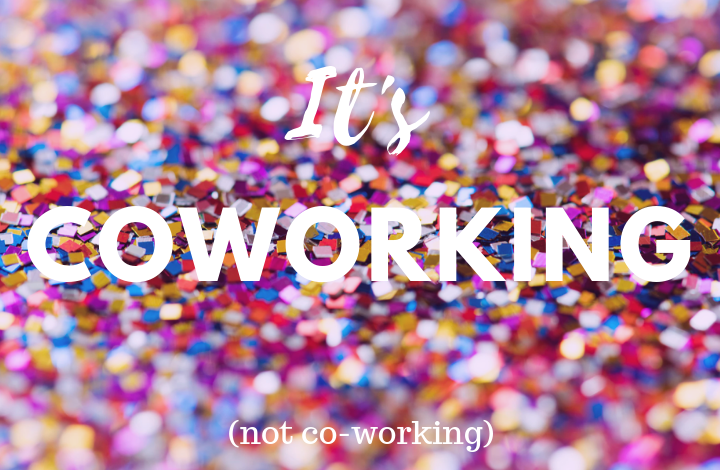If you’re looped in to coworking circles, you likely heard the collective squeals of delight last week when the AP Stylebook announced it would no longer include a hyphen in coworking.
For years—since the birth of the coworking movement, really—publications have insisted on writing the word coworking with a hyphen, turning it from something truly fresh and collaborative (coworking) into something old and tired (co-working).
Their insistence on doing so is due, in large part, to AP’s use of the hyphen. Publications look to AP for direction, so if AP used a hyphen, so did they.
But no more.
Sincere thanks to our (now) friends at AP! The coworking movement now has one less to-do on its plate. Here’s the official AP tweet on the matter:
“We heard your requests to clarify the style of coworking, as in sharing a work space but not having the same employer. It’s one of the Stylebook’s new entries this year.”
Why does the hyphen matter so much? For me, the hyphen was a refusal to acknowledge that coworking is something more than people working side-by-side, like traditional co-workers. It was a dismissal of an entire movement built around connection, collaboration, mutual support, friendship and the future of work.
But I wanted to know what my friends in the coworking world thought, so I posed the following question to the Coworking Content Alliance:
“I need your input regarding the big news about AP removing the hyphen from coworking. Why do we care?”
Here are the responses:
“Because we aren’t “co-workers” who work for the same company. We work WITH fellow coworkers. Coworking = work WITH coworkers, not FOR co-workers.” –Jerome Chang, Blankspaces
“Before, it was like having your name misspelled, but then having them (or their editors) say “well, other people spell your name this way, so I’m gonna keep using the other version.” –Alex Hillman, IndyHall
“Coworking has been lacking a uniform definition and this is one step towards that.” –Robert Kropp, Cowork 22
“We like to be together.” –Liz Elam, Link Coworking, GCUC
“At the start, we were confused which one to use because there’s no formal word for coworking without the hyphen. So it’s good to know now that what we’re using is a legitimate word already.” –Reena Labanan, Happy Hive Coworking
“It’s an acknowledgement of the movement we are building.” –Ashley Proctor, GCUC Canada, CoHIP
“Just shows how much growth the coworking community has gone through and creates distinction from co-worker!” –Christine Paula Love Bernasor
“I remember noting that they were perfectly happy to spell cohousing without a hyphen but for some reason coworking just didn’t make the radar. I was baffled.” –Susan Dorsch, Office Nomads
“It’s like the word “manufacturing.” It’s a noun, verb and adjective. Manu-facturing would be weird.” –Daryn DeZengotita, Table Coworking
“Simply consistency in our movement.” –Elaine McPherson, Centre for Business Excellence
“‘Coworking’ is literally what Brad Neuberg invented in 2005. It’s what Tara and Chris took and ran with, creating the Coworking Google Group, the Coworking Blog, and so on. Dozens of people found the word and started using it to describe their disparate projects around the world. Dozens turned to hundreds turned to thousands. To add a hyphen strips the word of its context and its origins. It implies the lowest common denominator, something devoid of meaning and context. Coworking has a story. It’s a word that was invented and shared and rallied around. It’s become a household name because of the movement that arose around it. It has a deep meaning that should not be forgotten. That’s why this is important.” –Tony Bacigalupo, New Work Cities
“Coworking tends to create stronger relationships in the workplace among independent businesses. By not hyphenating the word, it’s an additional layer that conveys the closeness, connections, and camaraderie-filled environment within our coworking spaces. Think about that, vs. a co-worker in a typical company/office setting–many function as peers, but have no real relationship at the end of the day. In coworking, your peers are more like a daytime family!” –Lisa Akinseye, Evolve Workplace
“As someone who has spent the better part of her life correcting people on the spelling of her own name, it’s my experience that those who actually take the time to learn a given name, also genuinely care about your personal brand, who you are, and what you stand for. I apply this directly to Coworking. I spend a good chunk of time (as we all do) explaining just what this movement is within startup ecosystems and the workspace industry; and those who don’t care about the proper spelling tend not to understand the communities we are building or the ventures we support. It’s a micro-aggression that I honestly didn’t have time to continue addressing. I’m too busy building ecosystems, fostering economic development, and supporting people in the non-stop world of the startup grind.” –Shervonne Cherry, Spark Baltimore
“Those who pay attention to these details are also those who respect others! And we want more if this everywhere!” –Diane Chevalard, Working Ensemble
“I always thought it was how this industry simply wanted to brand itself to make a clear distinction from co-workers who work for a corporation or any other employer.” –Melanie Banayat, WingSpace Coworking
“When I started coworking and created the term I very consciously dropped the hyphen. My intention is for coworking to be closer to the word collaboration, which does not have a hyphen, rather than co-worker. I also wanted the term to feel informal, and a dash in coworking felt awkward and difficult to type.” –Brad Neuburg, creator of coworking (h/t Alex Hillman)
“Because the industry is about connectedness and collaboration, so the word needs to be a whole just as each of us make a whole. When you see co-working it helps us identify the people who are using it for personal gain or to sound like they know what they are talking about. If our industry doesn’t make our own standard or guideline others will for us, as history shows with any movement defined by those not part of the action. If we as an industry don’t have a constant to go by then we won’t be able to spot the difference.” Carina Boston Pinales, Splash Coworking
There you have it. That little hyphen really did matter, and now you know why.
Resources
Does Coworking Have a Hyphen (h/t Alex Hillman, IndyHall)
Google Trend comparison for the terms “coworking” and “co-working” (h/t Darin Miller, Iron Clad Coworking)
What a Difference a Hyphen Makes: Coworking vs. Co-working (by Cristina Santamarina)
Batman coworking meme (h/t Yann Heurtaux)
Coworking space operators: Every Thursday I send out the Coworking Out Loud Newsletter, with industry insights, interesting articles and content tips for coworking spaces. Join the community!
Related Articles
Unlock the Power of Community: 8 Tips for Coworking Space Operators from the World Economic Forum
What Do You Want: Voices from a Coworking Community
The Coworking Video that’s Making Everyone Cry
You Can’t Force Community






